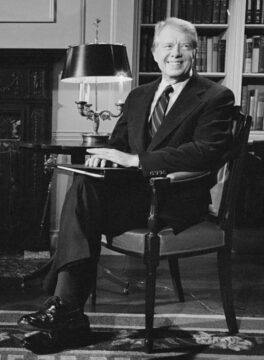Stuart E. Eizenstat in Foreign Affairs:
 On September 17, 1978, U.S. President Jimmy Carter faced a momentous crisis. For nearly two weeks, he had been holed up at Camp David with Egyptian President Anwar al-Sadat and Israeli Prime Minister Menachem Begin, trying to hammer out a historic peace deal. Although the hard-liner Begin had proven intransigent on many issues, Carter had made enormous progress by going around him and negotiating directly with Israeli Foreign Minister Moshe Dayan, Defense Minister Ezer Weizman, and Legal Adviser Aharon Barak. On the 13th day, however, Begin drew the line. He announced he could compromise no further and was leaving. The talks on which Carter had staked his presidency would all be for naught.
On September 17, 1978, U.S. President Jimmy Carter faced a momentous crisis. For nearly two weeks, he had been holed up at Camp David with Egyptian President Anwar al-Sadat and Israeli Prime Minister Menachem Begin, trying to hammer out a historic peace deal. Although the hard-liner Begin had proven intransigent on many issues, Carter had made enormous progress by going around him and negotiating directly with Israeli Foreign Minister Moshe Dayan, Defense Minister Ezer Weizman, and Legal Adviser Aharon Barak. On the 13th day, however, Begin drew the line. He announced he could compromise no further and was leaving. The talks on which Carter had staked his presidency would all be for naught.
But then, Carter made a personal gesture. Knowing that Begin had eight grandchildren and was exceptionally devoted to them, Carter signed photographs of the three leaders, which he addressed to each grandchild by name, and then personally carried them over to Begin’s cabin, where Begin was preparing to depart. As Begin read the names of his grandchildren, his lips quivered and his eyes watered and he put down his bags. Later that same day, he reached a breakthrough agreement with Sadat on what became the framework for the Egyptian-Israeli peace treaty six months later.
More here.
